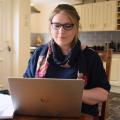
Cervical screenings can prevent around seven out of 10 cancers. So when reporter Donna-Louise Bishop was faced with her own scare, and wanted to raise awareness, imagine her surprise when she was told to 'stop going on about' her 'ladybits'.

It was 2016 and I was about to walk out of my local surgery when Emma, one of the practice nurses, ran after me - "you've not had your smear test yet".
Like a child caught with their hand in the cookie jar, I looked down and shook my head. Within minutes she'd booked me in for a few weeks' time.
It didn't matter that I'd had children; the truth is I was still embarrassed. And I wasn't alone. Last year Jo's Cervical Cancer Trust published the results of a survey which found that more than a third of women cited embarrassment as the main reason for not attending their cervical screenings .
Thankfully, any fears I'd had weren't nearly as bad as what I'd built up in my head. By the end of the appointment I was already planning to buy myself a congratulatory bar of chocolate and had to stop myself from daydreaming when Emma explained what would happen next.

We are fortunate in Norfolk to have a fantastic facility at the Norfolk and Norwich University Hospital. The lab at the Cotman Centre has been carrying out HPV testing since 2001 and has a record of meeting the 14-day turnaround target for the last ten years. So it is no surprise it was able to return my results quickly. Although when I received my letter within days, I feared the worst.
Long story short, I had developed high-grade pre-cancerous cells which resulted in having most of my cervix removed. I'd significantly reduced the chances of expanding my family and I'd be monitored closely for the foreseeable future.
I've glazed over these three years quickly but in all honesty it was a challenging and emotional time in which I thought my children would be left without their mother. My parents were my rock and kept me positive. It's now 2019 and I've finally been given the all clear.
Since then, I have written numerous articles about the importance of women attending their screenings. I have talked to cervical cancer survivors, women who avoid the routine test, medical professionals working in the field, charities trying to help with limited resources, and even loved ones left behind. And despite the dozens of important stories which I have reported, I still receive emails asking me when will I "stop going on about ladybits" and focus on something more important?

Sorry to disappoint, but I won't be.
I wouldn't like to speculate how many people have already forgotten the recent Channel 4 documentary, Jade: The Reality Star Who Changed Britain. In fact, I have spoken with medical professionals who claim the 'Jade Goody effect' lasted just six months.
What about the thousands of people who were left distraught after watching Coronation Street last week? The storyline featuring Sinead Tinker, played by actress Katie McGlynn, saw the young mother's life come to a tragic end following the return of her cervical cancer.
Over the last 21 years, screening numbers have been falling dramatically, so getting a mainstream audience for this topic has been great - but we still have a long way to go.
In parts of the UK women are waiting months for their results. Disabilities aren't being catered for and women have to travel hundreds of miles for specialist equipment to have a screening. And some women, like me, are being told to "stop going on about ladybits".
I for one will continue to fly the flag for anyone who has been affected by cervical cancer; the cancer which 3,000 women are diagnosed with every year in the UK; the cancer which takes away around two lives per day every single year - and very nearly took mine.
So thank you again to Emma, for running after me that day. I hope that for someone reading this, I can be their Emma too.



Comments: Our rules
We want our comments to be a lively and valuable part of our community - a place where readers can debate and engage with the most important local issues. The ability to comment on our stories is a privilege, not a right, however, and that privilege may be withdrawn if it is abused or misused.
Please report any comments that break our rules.
Read the rules here